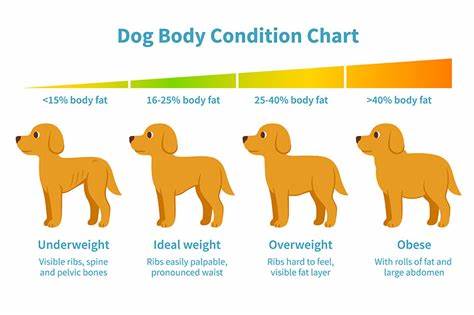As pet parents, we all want our dogs to be happy and healthy, but sometimes, extra treats and less activity can lead to weight gain. Just like in humans, carrying extra weight can have serious health implications for dogs. Knowing how to tell if your dog is overweight and understanding the consequences of obesity can help you take the necessary steps to keep your furry friend in good shape.
Signs Your Dog Might Be Overweight
-
Difficulty Feeling Ribs: When you run your hands along your dog’s sides, you should be able to feel their ribs without pressing too hard. If you need to press down to feel them, your dog might be carrying some extra pounds.
-
Visible Weight Gain: If your dog’s waist is no longer visible when viewed from above or if they have a sagging stomach, these are visual indicators of weight gain.
-
Lethargy or Reduced Activity: Overweight dogs may be less active or seem more sluggish. If your dog seems to tire quickly during walks or prefers lounging over playing, weight could be a contributing factor.
-
Difficulty Breathing or Panting: If your dog is panting excessively after mild exercise, it might be struggling with extra weight. This is especially true if your dog wasn’t previously prone to such behaviour.
-
Struggles with Movement: Jumping onto the couch or climbing stairs can become challenging for an overweight dog. If your dog hesitates before these activities or avoids them altogether, it’s worth considering weight as a factor.
The Health Risks of Obesity in Dogs
-
Joint Problems: Carrying extra weight puts more stress on your dog’s joints, leading to conditions like arthritis. This can make movement painful and significantly reduce your dog’s quality of life.
-
Heart Disease: Just like in humans, being overweight increases the risk of heart disease in dogs. The heart has to work harder to pump blood, which can lead to heart failure over time.
-
Diabetes: Obesity is a leading cause of diabetes in dogs. Managing diabetes requires daily care and can lead to further complications if not properly controlled.
-
Decreased Lifespan: Studies have shown that overweight dogs tend to have shorter lifespans. The excess weight accelerates the aging process and makes dogs more susceptible to various diseases.
-
Respiratory Issues: Extra fat around the chest can make it difficult for your dog to breathe, especially during exercise or in hot weather. This can lead to a decreased ability to regulate body temperature and an increased risk of heatstroke.
-
Digestive Disorders: Overweight dogs are more prone to digestive issues, including constipation and flatulence. These conditions can cause discomfort and further reduce your dog’s overall well-being.
What You Can Do
If you suspect your dog is overweight, the first step is to consult with your veterinarian. They can provide a proper diagnosis and recommend a weight loss plan tailored to your dog’s needs.
-
Diet: Switching to a high-quality, low-calorie diet can help your dog shed excess weight. Consider brands that use human-grade ingredients and avoid fillers and preservatives, like Barkly’s treats, which are perfect for dogs with sensitive stomachs.
-
Exercise: Regular exercise is crucial for weight management. Start with short walks and gradually increase the duration and intensity. Engage your dog in playtime with toys or games that encourage movement.
-
Portion Control: Avoid free-feeding your dog. Measure out meals and limit treats, especially high-calorie ones. Opt for natural, low-calorie treats that still satisfy your dog’s craving for a snack.
-
Regular Check-ups: Frequent visits to the vet will help monitor your dog’s weight and overall health. Your vet can make adjustments to the weight loss plan as needed.
Conclusion
Maintaining a healthy weight is essential for your dog’s longevity and quality of life. By recognising the signs of weight gain and understanding the potential health risks, you can take proactive steps to ensure your dog stays fit and healthy. Remember, your dog relies on you to make the best choices for their well-being—so let’s keep those tails wagging for years to come!

